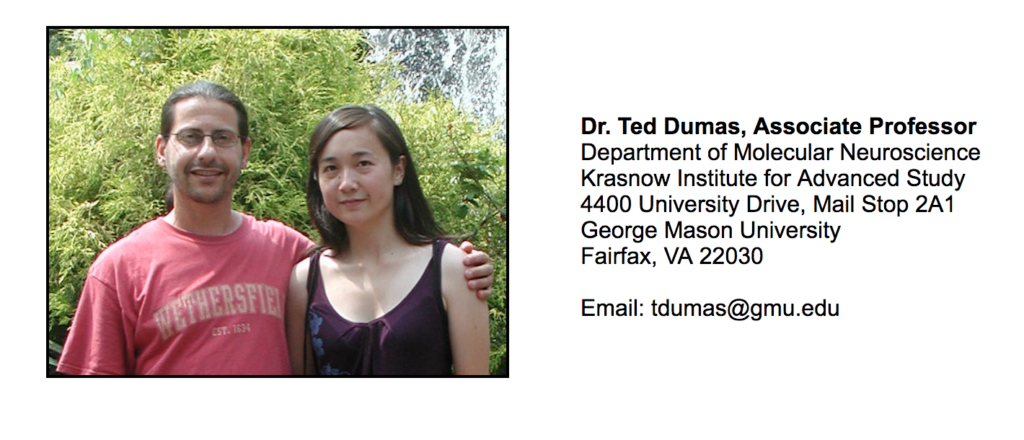As a Graduate Student working with Tom Foster (University of Virginia), my training centered on in vivo and in vitro electrophysiological recording, both extracellular and intracellular, and rodent behavioral assessment. My dissertation thesis was supported by an NRSA award from NIH and investigated the late postnatal development of excitatory synaptic transmission in the hippocampus. As a Postdoctoral Fellow (Robert Sapolsky, Stanford University; NRSA-supported) and Research Associate (Cliff Kentros, University of Oregon), I refined my behavior and physiology skills and gained substantial molecular expertise while developing new viral vector gene transfer methods and subcloning injection constructs to generate transgenic mice. When I became an Assistant Professor at George Mason University, I returned to the study of cognitive development and synaptic physiology with an improved arsenal of techniques in hand. I have built a laboratory complete with all of the necessary equipment and personnel to accomplish the proposed research goals. I was awarded tenure at Mason in February of 2015. My research team and I work with the belief that to fully understand changes in cognitive processes across the lifespan, and memory loss during aging and disease states, requires an understanding of how neural memory systems are built during development. Additionally, our research approach is geared to delineate factors that contribute to pathological neural maturation and neurodevelopmental disorders, such as autism spectrum disorders (ASDs) and Fragile X Syndrome, and relationships between memory gain during postnatal development and memory loss in aging. In the last decade, I have conferred two PhD students (and currently mentor two PhD thesis students), mentored over one hundred and forty undergraduate students, and hosted more than thirty high school students. I also teach courses at the graduate and undergraduate levels on the basics of neuron structure and function and on brain to behavior relationships. Additionally, I am or recently have been a PI (NIH/NIA) or Co-PI on other federally funded projects (DoD/ONR, DoD/DARPA) and have reviewed grant applications for NIH and NSF.

Research Interests
PBNJ Lab is highly interdisciplinary. We integrate transgenics, pharmacology, molecular biology, electrophysiology, and behavior testing and collaborate with physicists and mathematical scientists to learn how brain function relates to cognition and behavior. We study juvenile rats, transgenic mice, and tardigrades to address questions about how the brain encodes, stores, and retrieves memories about personal experiences.
Our Principle Investigator
Coming in August!! If Food Could Talk: Stories from Thirteen Foods Endangered by Climate Change
Coming in August!!





